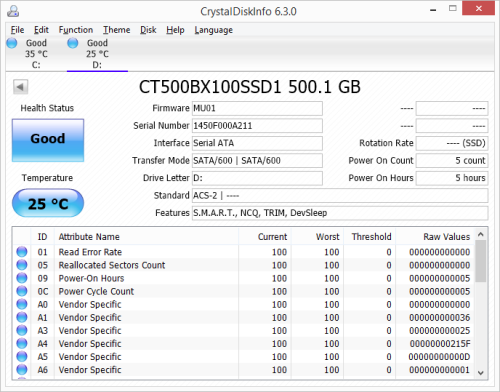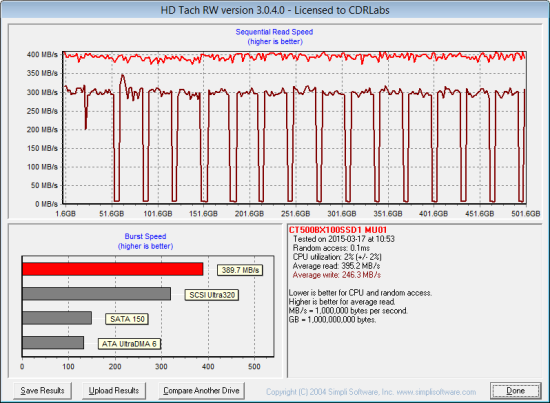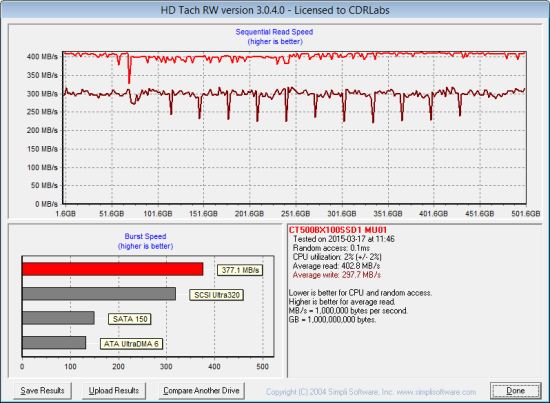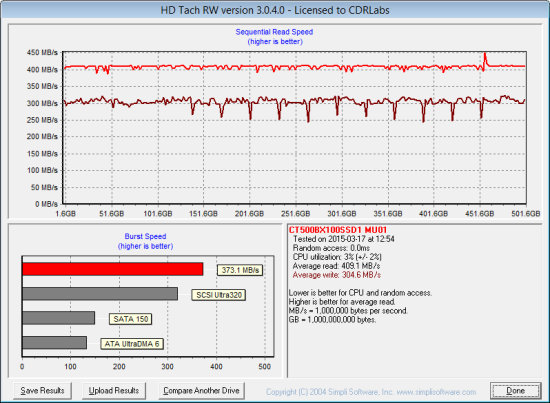TRIM Performance:
While SSD's offer many benefits, there are some downsides to using flash memory. One of the biggest issues people run into is performance degradation. Over time, an SSD will run out of fresh blocks and will have to write over data the file system has marked as deleted. This procedure is very complicated and can slow an SSD's write speeds considerably.
To fix this problem, most manufacturers have added TRIM support to their SSDs. The TRIM command allows an operating system, such as Windows 7, to tell an SSD which data blocks are no longer in use. Using this information, the drive pro-actively erases these blocks and adds them to the free block pool.

To test the BX100's TRIM and garbage collection functions, I first put the drive in a "dirty" state. I used Iometer to fill the entire drive and then ran a random write test for 30 minutes. This had little impact on the BX100's read speed. However, its average writing speed dropped to 246.3 MB/s.

Crucial BX100 - Dirty
To see how well the BX100 could recover, I let the computer sit for about 45 minutes and then reran the test. The drive wasn't able to reach the factory fresh performance shown in our earlier tests. However, its average write speed climbed up to 297.7 MB/s.

Crucial BX100 - After TRIM
Lastly, I used Parted Magic to perform a secure erase on the BX100. With the drive wiped clean, it had average read and write speeds of 409.1 MB/s and 304.6 MB/s, respectively.

Crucial BX100 - Secure Erased
Final Thoughts:
If you're looking for the best bang for your buck, Crucial's new BX100 SSD just might be it. The drive combines Silicon Motion's SM2246EN controller with Micron's 16nm 128gb NAND to deliver a fast, responsive computing experience at an affordable price. In our sequential read and write tests, the MX100 was able to read at speeds as high as 561 MB/s and write at speeds in excess of 431 MB/s. It also did surprisingly well in our random write tests, producing more than 68,000 IOPS at low queue depths. Moreover, it performed equally well with compressible and incompressible data and was able to sustain these speeds, even after intensive use.
With its lower price tag, it shouldn't be too surprising that the BX100's feature set isn't as extensive as Crucial's other consumer-class SSDs. The drive covers the basics by offering thermal monitoring, data path protection, active garbage collection and TRIM support, but lacks support for more advanced technologies like Data Defense, RAIN and Dynamic Write Acceleration. The BX100 doesn't offer support for hardware based encryption either. This probably won't be an issue for the average consumer. However, if data security is a concern, Crucial's MX200 SSD may be a better choice.
The BX100 is available now in 120GB, 250GB, 500GB and 1TB capacities. Prices on Amazon.com currently range from $68 up to $375, with the 500GB version reviewed here going for about $185.

Highs:
- Available in 120GB, 250GB, 500GB and 1TB capacities
- Good sequential and random read and write performance
- Performs equally well with compressible and incompressible data
- SATA 6Gb/s interface
- Large DRAM cache
- Supports TRIM, SMART and active garbage collection
- DEVSLP power mode
- Ultra-slim form factor
- Includes mounting spacer for 9.5mm applications
- 3 year warranty
- Affordably priced
Lows:
- Does not support hardware-based encryption
- Lower capacity drives have slower sequential write speeds

